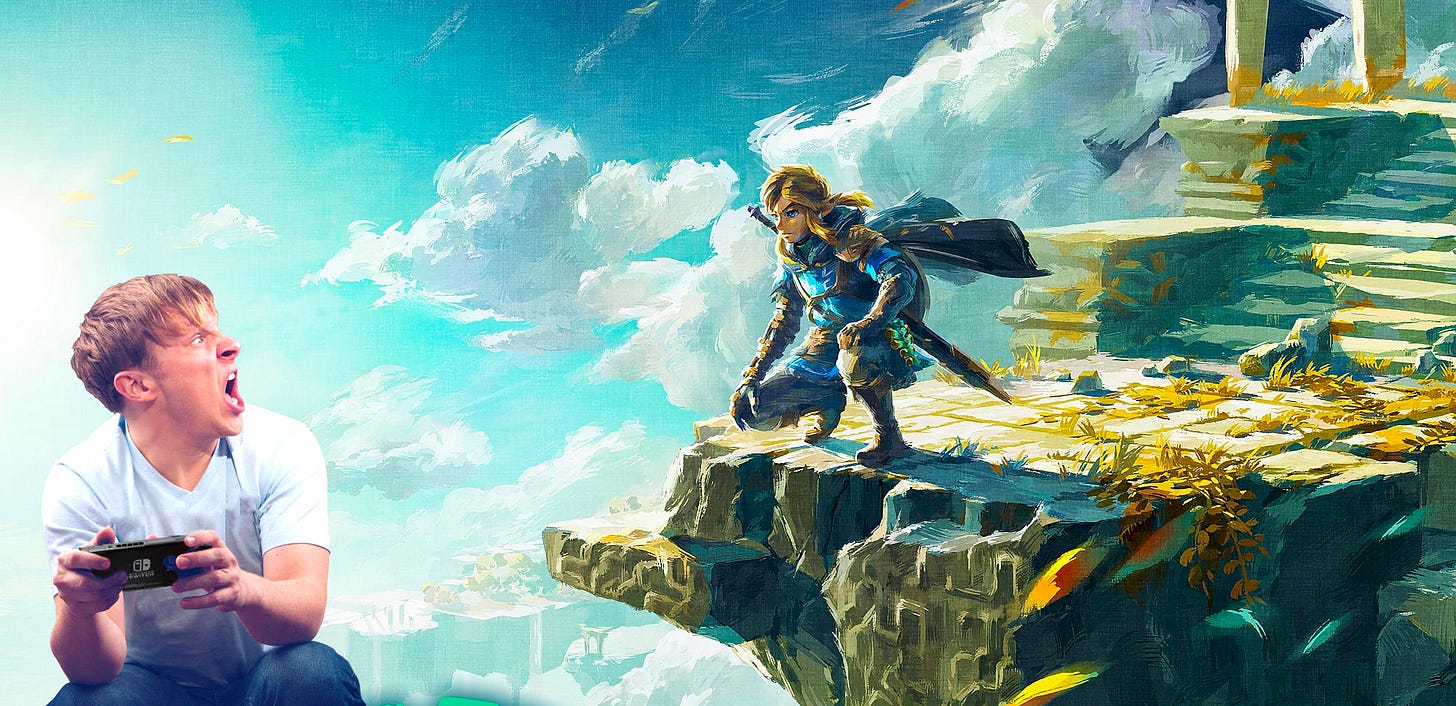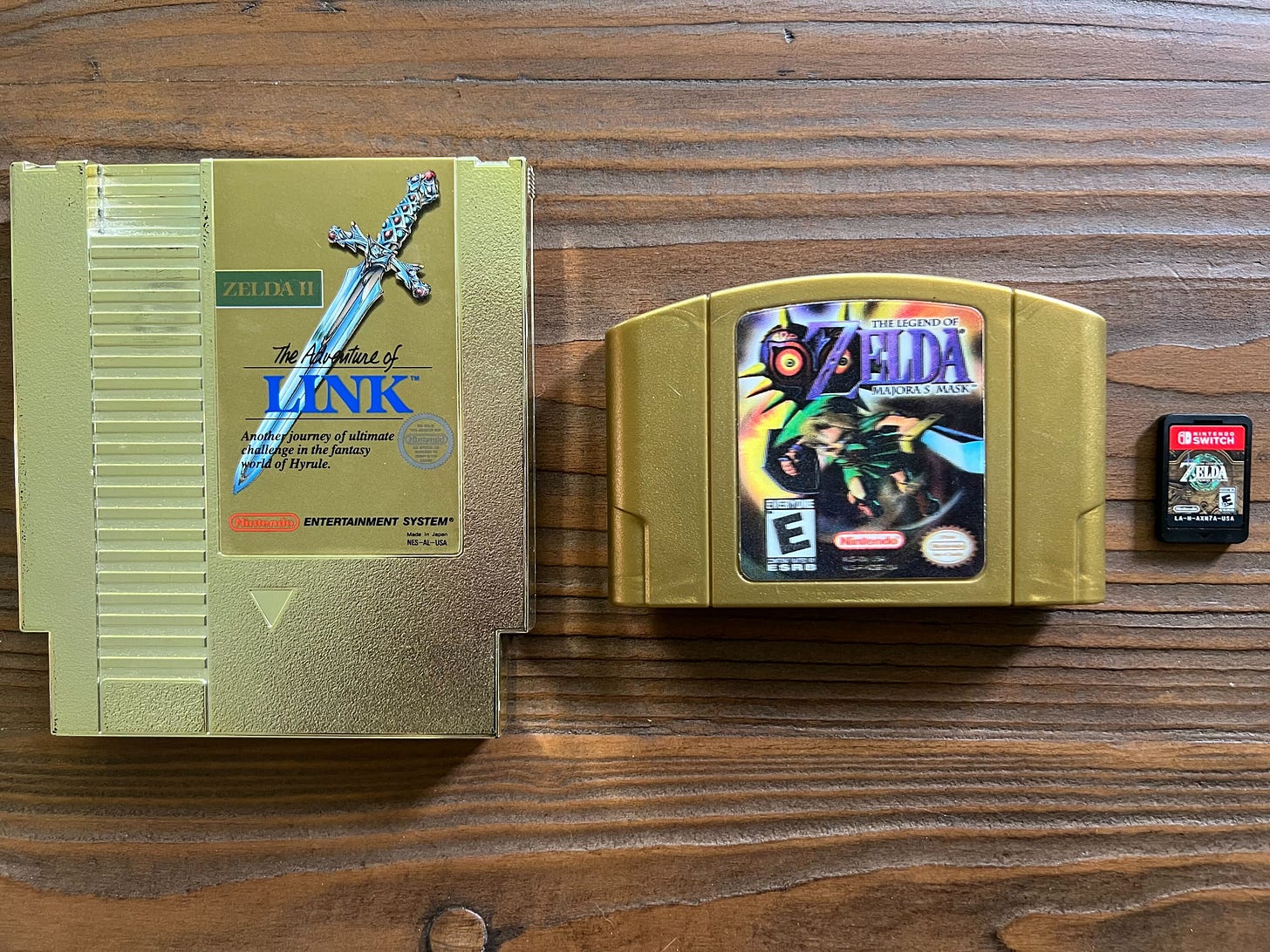Tears of the Fanboy
What We Can Learn About Approaching Gaming from The Legend of Zelda
I’ve been playing the new Legend of Zelda as of late, along with around 10 million other folks, it would seem. I won’t spill any ink explaining the merits of the game, as countless other sources have given the title effusive and well-earned praise. The fact that a new installment in the 40 year old Legend of Zelda series (oof, I felt that comment in my lower back) is reviewing well shouldn’t be much of a surprise - with rare exception, most of Nintendo’s marquee releases tend to be well critically-received. Nintendo is nothing if not reliable. It’s kind of their thing.
Similarly, nearly everyone suspected that the title would sell well - though perhaps not this well. 10 million units within three days of release virtually assures that Tears of the Kingdom (TotK) will reach a billion in sales, on track to beat Harry Potter as the the current sales leader of the year, and puts it roughly on pace with mega-seller franchises like Call of Duty or Grand Theft Auto. For an opening weekend, Nintendo has handedly beat any box office open this year - including their own. The Super Mario Bros movie cleared ~$377 million in the opening weekend, massive by any objective measure in Hollywood. I’ve droned on quite a bit about why the overlap between the gaming industry and Hollywood is significant, but suffice it to say the experience of Nintendo in 2023 at the box office and their home turf is a milestone. It also bears mentioning that while Super Mario represents a commercial exemplar for gaming to silver screen transitions, the success of the Harry Potter game made it clear that these transitions are a two-way street. That said, even the cultural might of Harry Potter was laid low by Zelda, a gaming IP which has only occasionally stretched beyond video game consoles.
Make no mistake, moving 15 million units is no small feat for Hogwarts Legacy, even with the halo effect of blockbuster IP like Harry Potter. Why the early numbers from Zelda are comparatively impressive is due to the fact that unlike other mega-sellers like Call of Duty, Grand Theft Auto, or Hogwarts Legacy, which are often released across multiple consoles and PC, Zelda is a Nintendo exclusive and only available on the Nintendo Switch. In other words, only those among the (admittedly impressive) install base of Nintendo Switches are likely purchasers of the game, meaning that the surface area of potential consumers is less broad than most best selling games.
Console exclusivity has never really been a blocker for Nintendo, where games like Pokemon sell at similar velocities and scale, though Zelda drops during a particularly heated discussion among a cankerous group of gaming fans: console “fanboys.” Epitomized by the so-called console wars in the 90s, a sort of tribalism has formed around adherents to one console or another (Nintendo, Playstation, and Xbox, with occasional glancing blows from PC gaming purists). Console “fanboys” are what consumer psychologists would call individuals with “high self-brand connection,” which is acute among high-cost products that engulf a great deal of our time (car brand loyalists are the classic example). The layman might use another word: Jerks. For many of these “fanboys,” it’s not enough to have their preferred console be great, others must be not great, and they are often dead-set to have toxic conversations towards this end with other very online people.
In short - any potential foible of a console-exclusive title, real or imagined, is ripe for attack. The graphical performance of recent console exclusives, particularly as it pertains to achievable frames per second (FPS) as an indicator of the computational power of the console in question has been a point of contention as of late, as has reusing assets in the creation of sequels like TofK. Not only was the Nintendo Switch underpowered relative to its competitors at Microsoft and Sony at release, it’s now hardware that is over 5 years old. TotK is plainly pushing this hardware to its absolute limits, causing the routine drops in FPS, in addition to running (best case) at an FPS which was described as unacceptable for other console-exclusive releases. Further, being a rare sequel in the Legend of Zelda series (where only three games have a direct sequel, and the story/continuity across the totality of the nearly 30 titles in the franchise is otherwise utter nonsense requiring multiple potential timelines to piece together), TotK leverages the totality of assets/engine/aesthetics of the previous title (Breath of the Wild).
The misfit sequels
This would naturally lead some vitriolic pockets of fanboys to lament the extent to which Nintendo gets a “pass” with respect to both its fans and critics. On the contrary, the performance and sub-4k visuals of the game are seemingly well-internalized by both groups - visual fidelity as the primary axis upon which a game (and relevant console) are judged is as limited a criticism as judging a movie for merely being in black and white relative to full color.
In reality, what makes a compelling experience is significantly more nuanced, and in some respects the fanboy laments above were the secret to TotK success, as revealed by an interview with long-time Legend of Zelda producer Eilji Aonuma. Notably, the team's focus was on the gameplay itself and the extreme lengths (and lengths of time) the developers put against polishing the core gameplay experience. The visuals of TotK get a pass, in part, because what the game accomplishes with its incredibly complex physics is nothing short of baffling. At some point, a tradeoff was made to prioritize how the game world functioned over how the game world looked.
Similarly, reusing assets among a team of project veterans (a rarity in the gaming industry more generally) allow for focus on innovation and fine-tuning rather than foundational aspects of the game (which places TotK in good company - some of the most innovative and fan-loved entries in the Legend of Zelda series tend to be the aforementioned rare direct sequel, which sometimes directly use assets or otherwise from their predecessor). What fanboys get wrong in the case of TotK is the myopia that defines them - in many cases, merely what makes their chosen console great rather than what makes a great experience mediated by the console.
You might be waiting for the connection to marketing in gaming - what fanboys and marketers in gaming alike tend to get wrong is the belief that popular, important games are those with photorealistic graphics and/or consumed through a specific console on a TV screen. Some of the most popular games are those with the most basic graphics (for example, indie marvels like Vampire Survivors) or consumed through devices as simple as mobile phones (also an option for Vampire Survivors, incidentally). To meaningfully engage with gaming as either a fan or a professional is to gain an appreciation for what makes a game tick beyond merely what the eye can see. Too much of the more recent conversations between advertisers and gaming opportunities have focused solely on blockbuster games principally designed for PCs or consoles. Make no mistake, the power of the gaming IP matters and the fandom attached to it is important, but demanding that the game be experienced through the biggest screen possible is out of step with the direction the gaming industry is heading because it is out of step with how players are increasingly consuming gaming content. While the fanboys will continue to do what they do best (being the worst?), marketers should understand how these games fit into the media landscape of their consumers, and the multifaceted ways in which fans appreciate them.
This truism becomes all the more important as it pertains to games that resonate heavily in popular culture like Legend of Zelda. Games in The Legend of Zelda series have been important blockbusters not because they push the boundaries on visuals, but because they push the boundaries on good gameplay in a way that continues to resonate among a fandom that has been in place for nearly four decades. Console fanboys are loud voices in gaming, but as is too often the case represents a minority that is often wrong - marketers can and should rise above.



